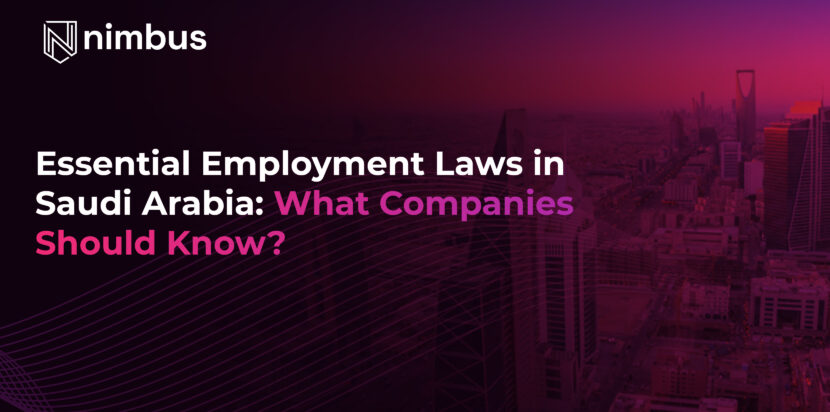Are you planning for business incorporation in Saudi Arabia? Then you need to have a proper understanding about the country’s employment laws.
With recent reforms introduced to Labor laws, it’s important that companies stay informed and compliant with these laws to ensure smooth operations, legal compliance, and an evolving workplace.
In 2024, the Ministry of Human Resources and Social Development (MHRSD) introduced major amendments to the Saudi Labor Law, aimed at enhancing employee rights and properly defining employer responsibilities. While these changes are designed to create a balanced and equitable work environment, they can be challenging for businesses unfamiliar with local regulations.
This post outlines the necessary points of the employment laws every parent company looking forward for business setup in the KSA should know, helping businesses to stay compliant and avoid costly mistakes.
Saudi Labor Law Updates: What’s Changing?
On August 6, 2024, the Saudi Council of Ministers approved significant amendments to the Labor Law. These changes were focused on:
– Regulatory Improvements:
Simplifying and modernizing labor laws to support businesses.
– Job Creation:
Strengthening employment opportunities for Saudi nationals, particularly in Small and Medium Enterprises (SMEs).
– Aligning with Economic Goals:
Ensuring that Saudi labor laws reflect best practices in economic and workforce development.
– Balancing Employer & Employee Needs:
Strengthening worker protections while giving employers more flexibility.
Key Employment Regulations Every Parent Company Should Know

1. Saudization (Nitaqat Program)
Saudi Arabia’s Nitaqat program is a structured initiative to increase local employment across industries.
Companies are assigned a classification namely Platinum, High Green, Medium Green, Low Green, or Red, based on their compliance with Saudization targets. Here’s how a company’s classification impacts the application of the laws.
– Platinum, High Green & Medium Green
- Eligible for new work visas for expatriate employees.
- Allowed to change job titles for expatriate workers.
- Can renew work permits and transfer sponsorships from other companies.
- Need to include the Nitaqat program immediately
– Low Green
- Cannot apply for new expatriate worker visas.
- Cannot change expatriate workers’ job titles.
- Can renew work permits for existing employees.
- Need to include the Nitaqat program immediately.
– Red (Non-Compliant Companies)
- Cannot apply for new work visas.
- Cannot issue work permits for new workers and neither renew or transfer work permits.
- Cannot transfer sponsorship of a worker
- Limited access to government services and contracts.
2. Social Insurance Law (GOSI)
The General Organization for Social Insurance (GOSI) oversees social security in Saudi Arabia, ensuring financial protection for employees and their families. Contributions are mandatory for both Saudi and foreign workers, with benefits covering:
– Work-Related Injuries:
Full medical coverage and daily compensation for temporary disabilities.
– Disability & Death Benefits:
Monthly pensions or lump-sum payments based on service duration.
– Retirement Pension:
Available at age 60 with a minimum of 120 months of contributions.
– Early Retirement:
Employees in high-risk jobs can retire early after 120 months of contributions.
Employer Contribution Breakdown
In case a company fails to comply with GOSI regulations, it can end up paying fines up to SAR 10,000 per violation, with penalties doubling for repeated offenses.
3. Employment Contracts: What’s Required?
Every employee in Saudi Arabia, whether local or expatriate, must have a written employment contract that includes:
– Job Title & Responsibilities
– Salary & Benefits
– Working Hours & Leave Policies
– End-of-Service Entitlements
Contracts must be in Arabic (or include an Arabic translation) and should be registered with Qiwa, an online platform under the MHRSD.
Standard Employment Terms in Saudi Arabia
– Working Hours:
48 hours per week (8 hours per day, 6 days a week). Employees must receive a 1-hour break after 5 consecutive work hours.
– Annual Leave:
21 days per year (increasing to 30 days after five years of service).
– Sick Leave:
Up to 120 days per year, with the first 30 days fully paid.
– Notice Period:
30 days (employee resignation), 60 days (employer termination).
– End-of-Service Benefits:
Based on the employee’s tenure and last drawn salary.
4. Severance Pay & End-of-Service Benefits
Employees are entitled to severance pay if they complete at least two years of service. The calculation follows this structure:
– First 5 Years: Half a month’s salary per year of service.
– Beyond 5 Years: One full month’s salary per year of service.
Severance pay applies even if an employee resigns or is terminated, except in cases of gross misconduct.
5. Salary & Deductions
Saudi Arabia does not enforce a universal minimum wage, but all salaries must be paid monthly and on time.
– Basic Salary: Fixed monthly wage.
– Allowances: Housing, transportation, and other benefits.
– Overtime Pay: One and half times the regular rate for weekdays and twice the regular rate (for Fridays & public holidays)
Deductions can only be made for taxes, social insurance, or other legally permitted contributions.
What Happens If a Company Doesn’t Comply?
Non-compliance with Saudi labor laws can result in:
– Fines up to SAR 10,000 per violation (double for repeat offenses).
– Temporary suspension of business operations.
– Ineligibility for government contracts & tenders.
– Visa & work permit restrictions.
Employers who consistently violate labor laws risk losing their business licenses and damaging their reputation in the Saudi market.
Ensure Compliance with Saudi Employment Laws and Enjoy Smooth Operations
Saudi Arabia’s labor laws are designed for benefitting both employers and employees, and aim to facilitate a more dynamic and fairer workplace. While these regulations may seem complex, understanding and implementing them correctly will help your company operate smoothly and avoid legal issues.
To make compliance easier, consider outsourcing HR services. This way you can keep your focus on growing your business while the experts take care of employment regulations and company formation in Saudi Arabia.



